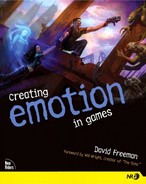NPCs may not be alive, but that doesn't mean they can't have complex feelings toward you.
This chapter discusses
ways to make it feel as if major NPCs have emotionally complex relationships with the player.
In this chapter, we're not talking about how you, the player, feel toward the NPC characters in the game, but how they feel toward you.
Remember how Princess Leia had mixed emotions toward Han Solo?
This is an example of a technique called Layer Cakes, which I described in Chapter 2.8. It means giving one character layers of feelings toward another. It's a Deepening Technique because layers equal depth.
What if you're playing a game and have taken on a role like Han Solo's, and there is an NPC like Princess Leia?
For example, you're a swaggering gunslinger in a post-Apocalyptic America. It's survival of the fittest, but there are people in need and in danger: a group of innocents who are hiding in mountain caves, terrorized by the thugs who roam the landscape. They could use your help—but will you choose to give it?
There are incentives to help them. Initially, the incentives are mostly internal, moral ones (if you're leaning that way while playing the game, which you might not be). Down the line there are more tangible rewards, although you don't know that yet.
But there are also incentives to not help them, such as dangers to you. Perhaps if you help, you'll miss out on riches, weapons, excitement, and so on. (Chapter 2.20, “First-Person Character Arc Techniques,” offers more detail on balancing incentives.)
Let's say you're thrown together with, or periodically run into, a sexy, headstrong woman named Kira (an NPC). She's all heart, with her courage directed toward helping those who need protection.
Periodically you join forces, but at other times you pursue your own agenda.
She could exhibit all those layers of feelings toward you that Princess Leia felt toward Han Solo in Star Wars—Episode IV.
NPC Toward Player Relationship Deepening is part of Emotioneering because when a character has mixed feelings toward you, it resembles life itself, and thus is emotionally engaging. I'm sure there are people who have various layers of feelings toward you, just as there are people toward whom you have different feelings simultaneously.
In the example, the types of feelings Kira exhibits toward you might depend on your actions and other choices—which means the game would have to keep track of (or “flag”) the choices you make, so these can govern Kira's actions and dialogue around you.
The two illustrations depict two moments in another example game.
You play the guy. You and the woman, Carey, are both detectives. The first illustration shows her regular feelings toward you. She's generally annoyed with your cocky, swashbuckling attitude. (But you've a right to be cocky because you're so good at your job, right?)
The moment depicted in the second drawing comes later in the game; you stumble upon a loving drawing she's done of you.

Carey obviously feels both annoyance and love toward you. This is classic Layer Cakes, and it results in NPC Toward Player Relationship Deepening. Layers, remember, create depth.
In summary, why not take one of the major NPCs in your game and see if it's appropriate to have that character feel different layers of emotion toward the player?

Take a look at the color painting on page 1.
In this hypothetical game, there's a boy who turns into a dragon. It's due to no fault of his own, but is rather the result of a curse put on his parents by an angry wizard. The people of the land want to kill the boy, for when he takes the form of a dragon, he wreaks destruction.
Yet you know that the only chance of destroying the big boss you must fight at the end of the game is with the help of this boy/dragon, so it's critical that you ensure his safety. During the game, you must lead him across the land. When he's a boy, you need to protect him from those who try to kill him. Yet when he turns into a dragon, he tries to kill you—he can't help himself. In those situations, you need to injure or weaken him without killing him. So sometimes you're protecting him, and sometimes you're fighting him.
Other factors make your relationship with him even more complex. In one situation, when he's a dragon, he kills some innocents who don't deserve to die (they weren't even attacking him). Further complexity is added in that, to help you fight the big boss at the end, he is willing to sacrifice himself as penance for the innocents he hurt earlier.
You're likely to have many layers of feelings toward the boy:
A desire to protect him.
Fear of him when he's a dragon.
Pity toward him for being the victim of a curse.
Admiration for his willingness to sacrifice himself to help you kill the big boss.
This would truly be an example of Player Toward NPC Relationship Deepening.
Because the breadth and depth of emotion in a game is heightened when Emotioneering techniques are used in combination, I feel it's always worth pointing out such examples when they occur in some of the hypothetical games described in the book. The game with the boy/dragon employs a few other Emotioneering techniques in addition to Player Toward NPC Relationship Deepening:
Because the boy is the subject of undeserved misfortune, he has NPC Rooting Interest (see Chapter 2.10).
Protecting an NPC and taking responsibility for him causes a player to bond with him, which I call having Chemistry with the NPC. It's a Player Toward NPC Chemistry Technique (see Chapter 2.11).
When the player finds himself protecting the boy, even though the boy, in dragon form, has tried to kill him, and even though, while a dragon, he killed some innocents, this is an Emotionally Complex Situation (see Chapter 2.15).
When the boy is willing to sacrifice himself in penance for the deaths he has caused (even though these were the result of a curse put on his parents), this not only gives him additional Rooting Interest (see Chapter 2.10), but Self-Sacrifice and Wisdom are each techniques that give him depth. They're NPC Deepening Techniques (see Chapter 2.2).
By the end of the game, the player will have truly experienced some emotional and moral complexity. For example, the player will have seen that the boy is right in wanting to live; the villagers are right in wanting to kill him. The boy's willingness to sacrifice himself in the end, to restore his feeling of self-worth and to punish himself for his crimes while in dragon form, could be equally argued to be reasonable and unreasonable. The player's character will be loved by many people in the land for daring to take on the big boss—but the player's character will also be despised by others who were victims of the boy when in his dragon form.
Experiencing the emotional and/or moral complexity of a situation, especially when these complexities develop over the course of a game, can leave the player wiser and thus deeper. They're First-Person Deepening Techniques (see Chapter 2.21).
Games traditionally have NPCs feel one way or another toward the player (or the player's character). They react to the player as a friend or foe. In your own life, however, there are, no doubt, people whose feelings toward you are complex.
NPCs with complex emotions are more life-like. So, why not have one of the major NPCs in your game feel different layers of emotion toward the player?
